20162017学年高中英语Module3MyFirstRideonaTrain模块综合测评外研版必修1
- 格式:doc
- 大小:63.00 KB
- 文档页数:14
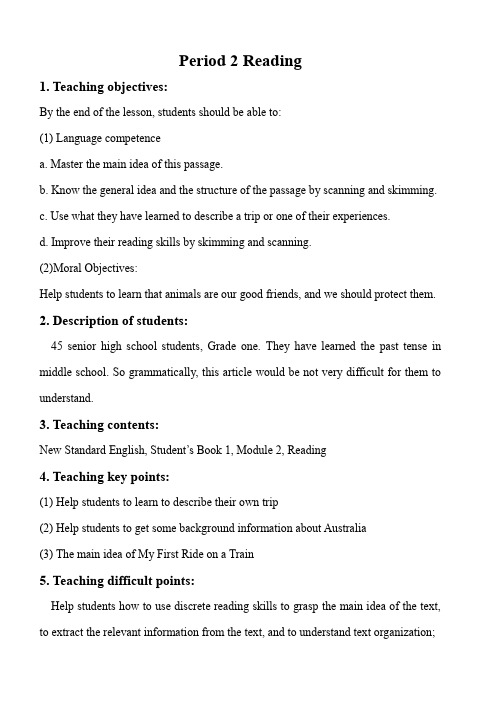
Period 2 Reading1. Teaching objectives:By the end of the lesson, students should be able to:(1) Language competencea. Master the main idea of this passage.b. Know the general idea and the structure of the passage by scanning and skimming.c. Use what they have learned to describe a trip or one of their experiences.d. Improve their reading skills by skimming and scanning.(2)Moral Objectives:Help students to learn that animals are our good friends, and we should protect them.2. Description of students:45 senior high school students, Grade one. They have learned the past tense in middle school. So grammatically, this article would be not very difficult for them to understand.3. Teaching contents:New Standard English, Student’s Book 1, Module 2, Reading4. Teaching key points:(1) Help students to learn to describe their own trip(2) Help students to get some background information about Australia(3) The main idea of My First Ride on a Train5. Teaching difficult points:Help students how to use discrete reading skills to grasp the main idea of the text, to extract the relevant information from the text, and to understand text organization;6. Type of the lesson: Reading7. Lesson duration:40 minutes8. Teaching procedure:AppendixAppendix1:Say something about your travel:When:Where:With whom:How did you go there?What did you do and see:What’s your feeling?Appendix 2:Recently I had my first ride on a __________ train with my friends, We got on inSydney,and________ in Alice Springs, right in the _______of Australia,more than four thousand kilometers ____. We ____ two days and nights on the train.The train was________. We ate great meals _____ by experts. The scenery was first_______, and then we saw ________ farms.Why was the train called Ghan? A long time ago, Australians tried______ horses, but the horses didn’t like the hot weather and sand. They brought _____ from Afghanistan. Camels are ______ better than horses for _______a long distance. Then, the government has built a new_______. So they didn’t need the camels any more.long-distance / got off / middle / away / spent / comfortable / cooked / colorful / abandoned / riding / camels / much / traveling / railway Appendix 3: HomeworkIn 1925, the government passed a law which allowed people to shoot the animals if they were a problem. What do you think of it?Write a short passage to express your opinion.。
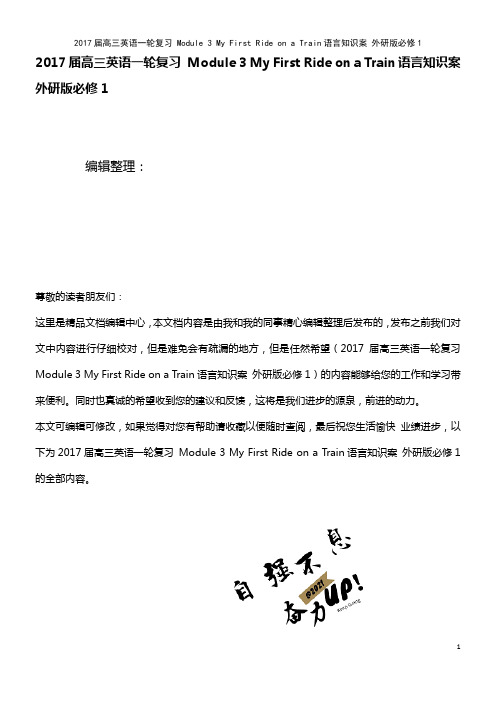
2017届高三英语一轮复习Module 3 My First Ride on a Train语言知识案外研版必修1编辑整理:尊敬的读者朋友们:这里是精品文档编辑中心,本文档内容是由我和我的同事精心编辑整理后发布的,发布之前我们对文中内容进行仔细校对,但是难免会有疏漏的地方,但是任然希望(2017届高三英语一轮复习Module 3 My First Ride on a Train语言知识案外研版必修1)的内容能够给您的工作和学习带来便利。
同时也真诚的希望收到您的建议和反馈,这将是我们进步的源泉,前进的动力。
本文可编辑可修改,如果觉得对您有帮助请收藏以便随时查阅,最后祝您生活愉快业绩进步,以下为2017届高三英语一轮复习Module 3 My First Ride on a Train语言知识案外研版必修1的全部内容。
Module3My First Ride on a Train 语言知识探究案Ⅰ.词形变换【自主学习】1.distance(n。
)距离→________(adj.)遥远的2.frighten (vt)使吃惊;惊吓→__________(adj。
)受惊的,感到害怕的→__________(adj。
)令人害怕的→________(n。
)害怕3.interview(n。
)面试;面谈→___________(n。
)(面试时的)主考官;面谈者→__________(n.)参加面试者;接受采访者4.product (n.)产品→________(v。
)生产→__________(n。
)生产5.abandoned (adj.)被遗弃的→________(v.)遗弃;抛弃6.________(adj。
)疲惫不堪的→exhaust (vt。
)使疲惫不堪→___________(adj。
)令人疲惫不堪的7.color(n。
) (颜色) →________(adj。
)多姿多彩的Ⅱ。
短语盘点III 。
重点知识 ●distance 。

英语ⅰ外研版module3myfirstrideonatra教课方案【一】教材剖析本模块是经过旅行经历介绍风光,关怀学生学会对于交通工具和地貌等自然现象的词语,学会运用表示过去的用语作回想、写游记、介绍风光。
【二】教课目的1. 知识目标语音句子中的重音词汇abandonedcassettecircuscolorfuldesertdiamondexpertfarmfieldshelicopterlawtramshootkindergartenproductrecentlyscenerysupply词组inthecentralpartof,along-distancetrain,darkred,untilthe1920s,onthecoastof,outofdate,adiningcar,comicbooks,forthefirsttime,feelnervous,aspeedof语法-ed 形式作形容词;表达过去时间的词语或词组功能礼貌用语话题介绍旅行经历;介绍童年故事2. 能力目标1)语言技术:听听懂对事件的回想、旅行介绍并猎守信息说运用过去时间回想;运用含有-ed 句子介绍风光读Scanning,skimming,carefulreading,generalization;inference等阅读微技术训练写用所学的词汇、词组、及含-ed 的句子写介绍旅行状况的文章和各样回想3.感情目标 : 热爱祖国河山;为祖国建设感人骄傲;倡议文明礼貌【三】教课重难点要点: 1. 怎样使用地道英语描绘风光、事件或回想2.正确理解并应用 -ed 形容词3.怎样礼貌进行平时对话难点 : 能用得体的英语表达自己,描绘过去的难忘经历【四】学情剖析经过学生的旅行经向来说说自己的感觉 , 应利用这一点,让学生对于第一次睁开话题议论,同时经过预习,讲堂训练让学生掌握词汇,短语用法,并能灵巧运用。
【五】教课方法教案导学:见教案新讲课教课差不多环节:预习检查总结迷惑; 情形导入展现目标;合作研究精讲点拨;反省总结当堂检测;发导教案部署预习。
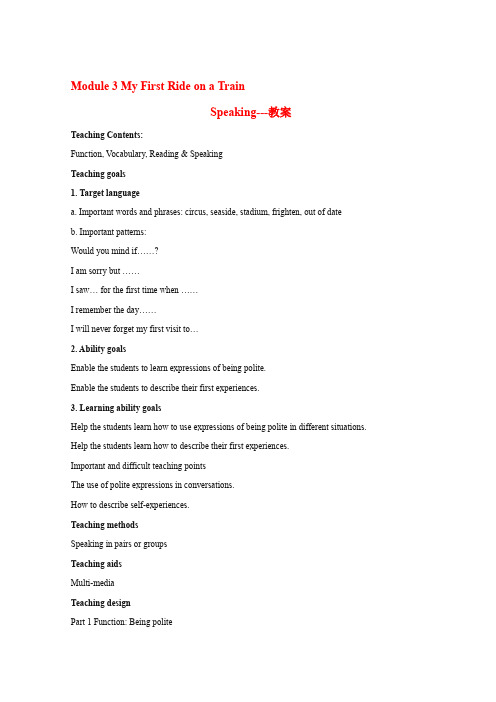
Module 3 My First Ride on a TrainSpeaking---教案Teaching Contents:Function, V ocabulary, Reading & SpeakingTeaching goals1. Target languagea. Important words and phrases: circus, seaside, stadium, frighten, out of dateb. Important patterns:Would y ou mind if……?I am sorry but ……I saw… for the first time when ……I remember the day……I will never forget my first visit to…2. Ability goalsEnable the students to learn expressions of being polite.Enable the students to describe their first experiences.3. Learning ability goalsHelp the students learn how to use expressions of being polite in different situations. Help the students learn how to describe their first experiences.Important and difficult teaching pointsThe use of polite expressions in conversations.How to describe self-experiences.Teaching methodsSpeaking in pairs or groupsTeaching aidsMulti-mediaTeaching designPart 1 Function: Being politeWarming-upRetell the test “My First Ride on a Train” in your own words.Task Polite conversations (15 minutes)Activity 1 Act and discuss (group work, winners rewarded)Students act out the dialogue. Discuss the questions in ②, Page 25.1. What do you think of the ticket inspector’s attitude?2. What expressions could you use to change it?Activity 2 Brainstorming Say as many polite expressions as possible.Activity 3 Make new dialogues according to picture 1 or 2. Try to use the polite expressions in ③and ④. (Pictures provided)③Excuse me….Could I (see your ticket)?Could I possible (see your ticket)?Would you mind (showing me your ticket)?Would you mind (if I saw your ticket)?I’m very sorry but (this is an old ticket).The fact is that (it’s out of date).④ What time does the train arrive atWhere do I change to get to …?Is it possible to open the window?Is there a dining car on this train?Part 2 Reading & SpeakingTask Ask and answerActivity 1 Read about people’s childhood memories.Which are happy and which are unhappy? (Individuals)Activity 2 Jigsaw reading and interviewing5 groups read and other groups bring out questions.Interview.Part 3 V ocabularyTask Childhood memoriesActivity 1 Read the places and activities. (Page 25)Activity 2 Tell me your first time to…(when to do, what to do, who to go with, how to go, happy or unhappy)Activity 3 Talk showThree students act as famous persons. One acts as TV host, talking bout their childhood memories. Homework:Write about your childhood memories. ( about 100~ 120 words)。
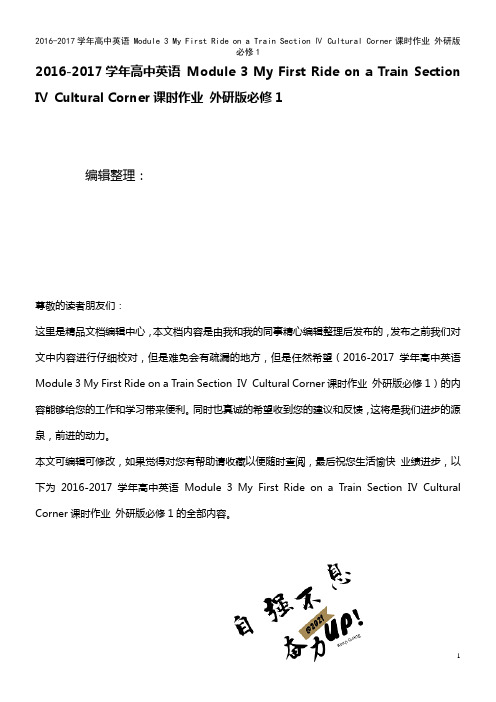
2016-2017学年高中英语Module 3 My First Ride on a Train Section ⅣCultural Corner课时作业外研版必修1编辑整理:尊敬的读者朋友们:这里是精品文档编辑中心,本文档内容是由我和我的同事精心编辑整理后发布的,发布之前我们对文中内容进行仔细校对,但是难免会有疏漏的地方,但是任然希望(2016-2017学年高中英语Module 3 My First Ride on a Train Section ⅣCultural Corner课时作业外研版必修1)的内容能够给您的工作和学习带来便利。
同时也真诚的希望收到您的建议和反馈,这将是我们进步的源泉,前进的动力。
本文可编辑可修改,如果觉得对您有帮助请收藏以便随时查阅,最后祝您生活愉快业绩进步,以下为2016-2017学年高中英语Module 3 My First Ride on a Train Section ⅣCultural Corner课时作业外研版必修1的全部内容。
Section ⅣCultural Corner姓名:________ 测试时间:45分钟本卷总分:50分自评或老师评分:________基础训练Ⅰ.选择方框内的词,并用其适当形式完成下列句子错误!1. I bought a few ________ for my colleagues back at the office to remember my visit to London。
2.A black horse was on the inside ________ at the start of the race。
3.He found the match ________ and stopped watching it any longer.4.The opening ________ of the Olympic Games is often grand。
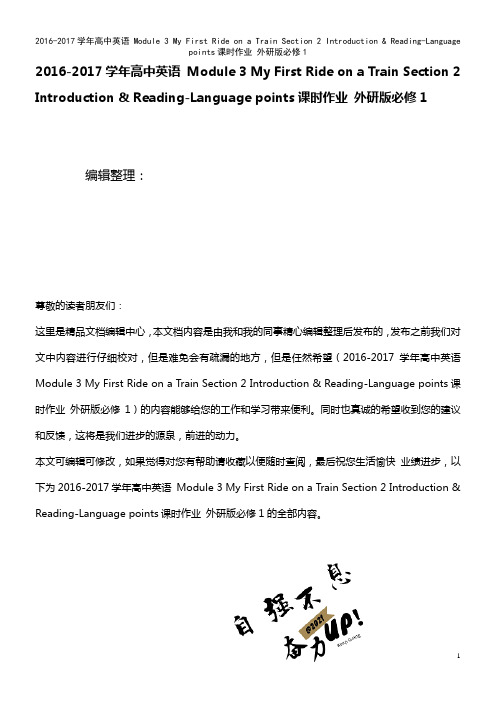
2016-2017学年高中英语Module 3 My First Ride on a Train Section 2 Introduction & Reading-Language points课时作业外研版必修1编辑整理:尊敬的读者朋友们:这里是精品文档编辑中心,本文档内容是由我和我的同事精心编辑整理后发布的,发布之前我们对文中内容进行仔细校对,但是难免会有疏漏的地方,但是任然希望(2016-2017学年高中英语Module 3 My First Ride on a Train Section 2 Introduction & Reading-Language points课时作业外研版必修1)的内容能够给您的工作和学习带来便利。
同时也真诚的希望收到您的建议和反馈,这将是我们进步的源泉,前进的动力。
本文可编辑可修改,如果觉得对您有帮助请收藏以便随时查阅,最后祝您生活愉快业绩进步,以下为2016-2017学年高中英语Module 3 My First Ride on a Train Section 2 Introduction & Reading-Language points课时作业外研版必修1的全部内容。
Module 3 My First Ride on a TrainSection 2 Introduction & Reading-Language points Ⅰ.单句语法填空1.Many people like to go to the pub,which is short________public house。
答案:for2.—Mum,I want to play computer games now。
—Sorry,you can’t________you have finished your homework。
答案:until3.—Can I smoke here?—Sorry。
高中英语外研版必修1Module3 My First Ride on a train单元练习一、听力(听力)(共20小题;共20分)第一节(共5小题;每小题1.5分,共7.5分)听下面5段对话或独白。
每段对话或独白后有一道小题,从每题所给的A、B、C三个选项中选出最佳选项。
听完每段对话或独白后,你将有10秒钟的时间来回答有关小题和阅读下一小题。
每段对话或独白你将听一遍。
1. When will the two speakers meet for the journey?A. At 2:00.B. At 2:50.C. At 5:00.2. What does the man need coins for?A. To make a call.B. To take a bus.C. To get a present.3. What will the woman do tonight?A. Prepare for a test.B. Go to the park.C. See a movie.4. What are the two speakers probably doing?A. Skating.B. Climbing.C. Cycling.5. How will the woman go traveling?A. B. C.第二节(共10小题;每小题1.5分,共15分)听下面4段对话或独白。
每段对话或独白后有几道小题,从每题所给的A、B、C三个选项中选出最佳选项。
听每段对话或独白前,你将有5秒钟的时间阅读每小题。
听完后,每小题将给出5秒钟的作答时间。
每段对话或独白你将听两遍。
听第6段材料,回答第6至7题。
6. What's the probable relationship between the two speakers?A. Couple.B. Friends.C. Neighbors.7. What is the man doing?A. Sharing his experience.B. Making a complaint.C. Asking for advice.听第7段材料,回答第8至9题。
外研版高中英语一Moudle3MyFirstRideonaTrain教案教学设计设计教师XX教学年级高中一年级(必修1)课题名称Unit 3 My First Ride on a Train(reading)教材版本外研版授课时刻30分钟The Analysis of this lessonThe topic of this lesson is about “trip”. It refers to talking about “an experience on a train in Australia”. It mainly introduces the history of the train and the scenery during the ride. Meanwhile, the use of past t ense and the use of past participles of verbs are also focused in this less on.2. The Analysis of the studentsThe students in class are in Senior Grade One. They have learn the past tense in middle school, so grammatically, this article would be not v ery difficult for them to understand.The topic is trip, and students will ha ve great interest in it.Teaching aimsLanguage pointsStudents can know the meaning of the key vocabulary: abandoned, d esert, colourful, shoot, supply, product, passenger, soil, diamond, distance, and use them to make sentence.(2) Language competenceStudents can improve their reading skills by skimming and scanning.With teacher’s help, students can master the main idea of this passa ge.Students can use what they have learned to describe a trip or one of theirexperiences.4. Teaching and learning difficultiesTeaching difficulties: Enable the students to understand the passage clearlyand learn to describe their own trip.learning difficulties: Students may fell difficult to find the main ide a of eachparagraph, and to analyze structure of this passage.Teaching aidsSome pictures about the train to arouse the interest of students.Teaching proceduresStep 1: Greeting: Good afternoon, boys and girls!Today, we are goin g to learn a passage, before we learning this passage, let’s review the w ords we’ve learned yesterday.Step 2: Lead-in (about 5 minutes)(1) Students read the words following me in page22.(2) Ask students “Do you like to travel?”“where you have went”, and I give some response to them. After that I ask them “which kind o f transportation you prefer?”Some students may say train, and I say “t oday, we are going to learn the passage “my first ride on a train.”Step 3: Pre-reading (about 2 minutes)Firstly, show one picture of the train, and then ask students.T:Look at this picture and the title, combine with your own experien ce, and try toguess what this passage will talk about.Guide students to find the probable answers..Further questions, show more pictures, and ask students.T: Do you think the train is very comfortable?S:...T:Does the food looks delicious?S:...T:Is the scenery beautiful?S:...T:Do you want to have a ride on this train?S:...Step 4:While-reading(about 20 minutes)After the questions and answers, let students turn to page 23 and rea d the passage.1, SkimmingAsk students to read passage and try to find out the main idea of each paragraph including paragraph.para 1 the scenery along the railwaypara 2 why is the train called the Ghanpara 3 things about camelspara 4 a general introduction to my first ride on a trainpara 5 how I spent the time on the trainpara 6 the fate of the camel2, Scanning(1)Ask students to read the first paragraph carefully and finish activit y 3 in the text book, and find the answer to explain why the other three ones are wrong.(2)Ask students to read the rest of the passage carefully, and answer the questions in activity4.(3)Ask students to fill the blankFor example:Alice made her first long-distance train ride at the age o f 18.(when)We______in Sydney and we ______in Alice Springs. (_____)______and I traveled on the famous Ghan______. (______)We ate great meals cooked by______. (______)They saw field, soil, desert, and ________ farms which were built morethan a hundred years ago. (________ )During the day, I sat and looked out of the window, and sometimes talked to other __________ (________ )I read books and listen to my Chinese ___________ (________ )Step 5:Post-reading(about 5 minutes)Group workAsk student to talk about one of their traveling experienc es, the contentshould include “when ,go where, with whom, how about the scenery orfood, what they did,”and talk to the classmates.Step 6: HomeworkAsk them write down their own traveling experiences, whichthey talked during the class.。
参评教案module3myfirstrideonatrain 本教案是依照外研版必修ⅠModule3的阅读内容所编写的。
旨在通过本课教学让学生了解交通工具与旅行相关的差不多知识,引导学生把握文中显现的生词和语言点,进一步提高学生的阅读水平,通过课文的主人公Alice Thompson 和她的朋友对第一次坐火车时对食物、风景和火车内人们相处情形的描述让学生了解交通工具和旅行时的所见所闻,进一步扩展了学生对未知世界的认识和了解。
二、教学课题知识储备方面:1、了解与出行有关的交通工具和旅行中的见闻,正确的使用交通工具有关的一系列单词和短语;2、能够读明白有关交通工具和旅行的文章,轻松把握文章的主体和细节的描述;能力提高方面:1、依照提供的材料、单词和短语培养学生对交通工具和旅行相关文章的表述能力;2、通过这一单元的学习和学生在互联网搜集更多与本课内容相关的内容加深学生对未知世界的了解,增强他们的求知欲。
三、教材分析课文内容:本课时是阅读课,有专门重要的作用。
让学生通过对课文的阅读提高阅读能力,如抓住细节信息和综合概括总结的能力等从而获得用英语提取信息分析问题和解决问题的能力。
具体内容分析如下:在Introduction部分提供了与旅行相关的交通工具的图片,要求学生认知并能灵活运用;在Pre-reading部分提供了三副图片让学生明白旅行之前应做的预备。
通过问答形式让学生对一个生疏的国家——澳大利亚的人文、地理和环境有所了解,为Reading部分做充分预备;Reading部分描述了Alice Thompson 和她的朋友对澳大利亚的食物、风景和火车内与人们相处的情形;Comprehending部分给出了两个练习题,课文细节配对题和角色互换讨论题,要紧是关心学生加深对课文内容的明白得。
教学重点:通过对外研版必修ⅠModule3中的Introduction & reading and vocabulary 的学习,提高学生用英语交流各种交通工具的语言综合运用能力,关心学生更好的明白得整篇文章,同时关心学生提高他们的阅读能力。
2016-2017学年高中英语Module 3 My First Ride on a Train Section ⅠIntroduction,Reading and Vocabulary课时作业外研版必修1编辑整理:尊敬的读者朋友们:这里是精品文档编辑中心,本文档内容是由我和我的同事精心编辑整理后发布的,发布之前我们对文中内容进行仔细校对,但是难免会有疏漏的地方,但是任然希望(2016-2017学年高中英语Module 3 My First Ride on a Train Section ⅠIntroduction,Reading and Vocabulary课时作业外研版必修1)的内容能够给您的工作和学习带来便利。
同时也真诚的希望收到您的建议和反馈,这将是我们进步的源泉,前进的动力。
本文可编辑可修改,如果觉得对您有帮助请收藏以便随时查阅,最后祝您生活愉快业绩进步,以下为2016-2017学年高中英语Module 3 My First Ride on a Train Section ⅠIntroduction,Reading and Vocabulary课时作业外研版必修1的全部内容。
Module 3 My First Ride on a TrainSection ⅠIntroduction,Reading and Vocabulary 姓名:________ 测试时间:45分钟本卷总分:50分自评或老师评分:________基础训练Ⅰ.根据句意及提示写出所缺单词的正确形式1。
After a long day’s hard work, feeling e________,he dropped down into an armchair.2。
They were forced to a________ plan because it was not practical.3.I have to pick up my daughter from the k______after work。
模块综合测评(三)Ⅰ.阅读理解(共15小题;每小题2分,满分30分)ATips for travel to EnglandGood afternoon,and welcome to England.We hope that your visit here will be a pleasant one.Today,I would like to draw your attention to a few of our laws.The first one is about drinking.Now,you may nor buy alcohol in this country if you are under 18 years of age,nor may your friends buy it for you.Secondly,noise.Enjoy yourselves by all means,but please don't make unnecessary noise,particularly at night.We ask you to respect other people who may wish to be quiet.Thirdly,crossing the road.Be careful.The traffic moves on the left side of the road in this e pedestrian crossings and do not take any chances when crossing the road.My next point is about litter(throwing away waste materials in a public place).It is an offence(冒犯)to drop litter in the street.When you have something to throw away,please put it in your pocket and take it home,or put it in a litter bin.Finally,as regards smoking,it is against the law to buy cigarettes or tobacco if you are under 16 years of age.I'd like to finish by saying that if you require any sort of help or assistance,you should contact your local police station,who will be pleased to help you.Now,are there any questions?1.The main purpose of this speech would be to ________.A.prepare people for international travelB.declare the laws of different kindsC.give advice to travelers to the countryD.inform people of the punishment for breaking laws【解析】作者意图题。
从文中第一段“...,and welcome to England.”和“I would li ke to draw your attention to a few of our laws.”可以得出选C。
【答案】 C2.How many laws are there discussed in the speech?A.Three. B.Four.C.Six. D.Five.【解析】细节理解题。
文章的第二、三、四、五、六段分别给出了具体内容:drinking,noise,crossing the road,litter and smoking。
【答案】 D3.From the speech we learn that ________.A.in this country,if you are under 18 years of age,you may not buy alcohol,but your friends can buy it for youB.you may not buy cigarettes or tobacco unless you are above 16 years of age C.because the traffic moves on the left side of the road,you must use pedestrian crossings when crossing the roadD.you can't make noise except at night【解析】推理判断题。
从文中的第二段可知,A选项中的“but your friends can buy it for you”是错误的。
C项的前后两句并不构成因果关系。
D项中的except at night和原文的particularly at night矛盾,也不正确,所以正确选项为B。
【答案】 B4.The underlined word “contact” in the seventh paragraph means ________.A.keep in touch with B.get in touch withC.join D.report【解析】词义猜测题。
根据倒数第二段可知contact的意思是“与……取得联系”,故选B。
【答案】 BBTravelling can be a fun way to gain life experiences,but what if you're a student and don't have enough money for a trip? Don't worry.Here are some useful tips.Save:This probably is the most important preparation for travelling.Cut expenses(花费)to fatten your wallet so you'll have more choices about where to go and how to get there.Plan ahead:Don't wait until the last minute to plan your trip.Giving yourself several months to get ready can mean security and savings.Do your homework:No matter where you go,research the places you will visit.Decide what to see.Travel books will provide information on the cheapest hotels and restaurants.Plan sensibly:Write down how much you expect to spend for food and hotels.Stick to(坚持)your plan or you may not have enough money to cover everything.Travel in groups:Find someone who is interested in visiting the same places.By travelling with others you can share costs and experiences.Work as you go:Need more money to support your trip,Look for work in places you visit.Go off the beaten path:Tourist cities may be expensive.You may want to rethink about your trip and go to a lessknown area.Smaller towns can have many interesting activities(活动)and sights.Pack necessary things:The most important things to take are not always clothes.Remember to take along medicine in case you get sick and snacks in case you cannot find a cheap restaurant.By planning sensibly,even students can enjoy their travel.Your travel experiences will be remembered for a lifetime.【语篇解读】主要讲述了如何明智地安排旅行。
5.Before your trip,the first thing you should do is ________.A.to make a plan of the routeB.to get information on the InternetC.to save money by spending lessD.to buy tickets ahead of time【解析】细节理解题。
根据第一条“Save:This probably is the most important preparation for travelling.”可知,节约也许是旅行最重要的准备,即首先考虑的是节约。
【答案】 C6.The writer advises you ________.A.to share costs with any other peopleB.not to go to wellknown placesC.not to visit dangerous placesD.to buy anything you want to buy【解析】细节理解题。